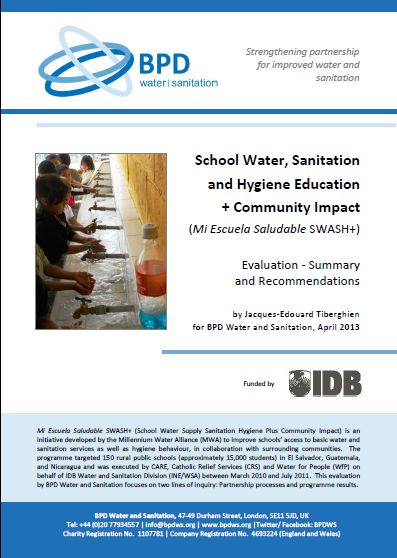School Water, Sanitation and Hygiene Education + Community Impact (Mi Escuela Saludable SWASH+) Evaluation - Summary and Recommendations
Tiberghien, J.-E. (2013)

Published in: 2013
Publisher:
Building Partnerships for Development (BPD), Water and Sanitation for the Urban Poor (WSUP), UK
Author:
Tiberghien, J.-E.
Uploaded by:
SuSanA secretariat
Partner profile:
common upload
6297 Views
95 Downloads
Location of library entry
Content - Summary
Mi Escuela Saludable SWASH+ (School Water Supply Sanitation Hygiene Plus Community Impact) was developed by the Millennium Water Alliance to improve schools' access to basic water supply and sanitation services as well as hygiene behaviour, in collaboration with surrounding communities. This evaluation by BPD focuses on two lines of inquiry: Partnership processes and programme results.
Mi Escuela Saludable SWASH+ (School Water Supply Sanitation Hygiene Plus Community Impact) is an initiative developed in 2008 by the Millennium Water Alliance (MWA), an association of eleven international NGOs with expertise in water supply, sanitation and hygiene education in rural and peri-urban areas formed in 2002. MWA’s lead members in Central America are CARE, Catholic Relief Services (CRS) and Water for People (WfP). The Mi Escuela Saludable SWASH+ programme co-funded by IDB and The Coca-Cola Foundation (TCCF), with a budget of US$2.15 million is the second phase of this regional SWASH initiative. It aims to improve access to basic water supply and sanitation services as well as hygiene behaviour in 150 rural public schools in El Salvador, Guatemala, and Nicaragua, targeting approximately 15,000 students. The programme, executed by IDB Water and Sanitation Division (INE/WSA) between March 2010 and July 2011, was launched in the context of the realignment process of IDB in 2007, which called for increasing IDB presence in the region, strategic alliances with private and civil society partners, and a renewed emphasis on the water and education sectors.
Parasitic worm infections and diarrhoea remain major threats for hundreds of millions of children, aggravating malnutrition, delaying physical development and affecting attendance and performance at school. Schools, at the very heart of communities, play a key role in shaping the attitudes, habits and expectations of future generations with respect to hygiene and water and sanitation services. Yet, in most of the world, their sanitary condition is appalling. Central American countries (Costa Rica excluded) are among those with the highest rates of child mortality in the Latin American region. Malnutrition and the lack of safe water and sanitation contribute to half of these deaths. According to the MWA, approximately 75% of rural public schools in the region lack access to safe water and/ or adequate sanitation. As a result, students are unable to adopt appropriate hygiene practices. WASH in schools projects enhance hygiene conditions by granting access to adequate watsan facilities and promoting hygiene behaviour. Such interventions also motivate children, and especially girls to attend school. Targeting public schools provides an effective entry point to community interventions. Because public schools are government-supported these programs are relatively easy to target and cost effective.
The programme was thus built around four components or key objectives, which tackle essential dimensions of WASH in schools work:
I. Water and Sanitation Infrastructure
II. Hygiene Promotion
III. Community Strengthening;
IV. Advocacy, Knowledge Management and Dissemination.
Bibliographic information
Tiberghien, J.-E. (2013). School Water, Sanitation and Hygiene Education + Community Impact (Mi Escuela Saludable SWASH+) Evaluation - Summary and Recommendations. Building Partnerships for Development (BPD), Water and Sanitation for the Urban Poor (WSUP), UK
Filter tags
English Latin America & Caribbean















